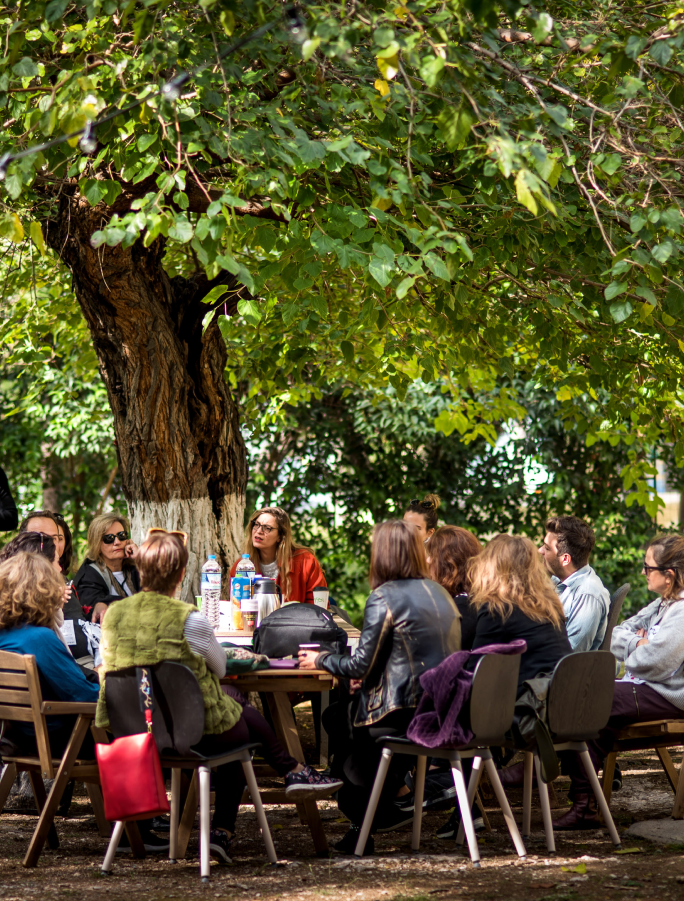The Selection Committee of the greek competition for the ECoC title for 2021 has published its report. The panel of experts gives recommendations to all candidate cities on the elements of their bid books that should be further developed.
You can find below the report on the candidacy of Elefsina:
The Elefsina bid has as its banner “Eleusis – EUphoria”. The main objectives are to have a catalytic effect on the city’s ongoing effort to become a dynamic cultural centre in the broader area of Western Attica leading to a positive impact on the lives of citizens. Its proposed programme has three main themes (each divided into four sub-themes) of “EUnvironment”, “EUrbanisation” and “The EU Working Classes”.
The bid covers the municipality of Elefsina and the region of Western Attica. The forecast operating budget is €22m of which €15.4m is allocated to programme expenditure.
The presentation set out clearly the strategic analysis of Elefsina as a postindustrial city seeking a new long term direction. Culture was to play a key role in the new city environment. The bid team had studied Glasgow and Bilbao. The panel suggests more similar cities could be researched to see how culture has been deployed alongside the economic transformation of a city from an industrial base to a service sector focus. The city’s cultural strategy was approved in February 2016 with a strong emphasis on social development and cultural rights for all. The panel learnt that the city intends to proceed regardless of the outcome of the competition. The panel saw evidence that the cultural transformation was underway with an emphasis on contemporary art and artists.
The bidbook identifies relevant themes and concepts crucial for contemporary societies and for the European project. These include the challenges of transition, the need to redefine environment, urbanisation and relationship with work. These themes are translated into 12 artistic and culture programmes. It previews cooperation with European artists and networks as well as with other ECOCs. New and existing cultural and creative hubs such as the Olive Oil press factory, the railway station and Kronos are to become cultural venues and facilities to support capacity building of the sector’s professionals and organisations. They will promote the creation of new creative businesses and the facilitate crossovers. The panel would expect a clearer, detailed and elaborated diagnosis on the sectoral needs with a deeper feasibility, management and sustainability plan for these developments. The bid proposes an interesting vision of the artistic director as a creative networker. This is an innovative approach.
The bid presents a lively artistic and cultural scene, active civil society organisations and local ethnic associations. It proposes cultural neighbourhood councils. There is still a need to profile more clearly the different communities and target audiences in the city, their challenges and how the ECOC programme might include and contribute to their expectations. The bidbook informed the 10 panel that 80% of the city’s current cultural output was from the independent sector; the panel would seek more information on this sector and their intended role in the ECOC.
The panel appreciated a focus on residencies, especially those aimed at early career artists. The panel noted the emphasis given to the “Innovation and Capacity Development Centre” as a way to address the acknowledged lack of expertise in cultural management in the city. The panel expects more information on its programme, staffing and sustainability. The indicative projects in the bidbook included many which took place in 2015 or are planned in 2016. They demonstrated the type of projects planned for 2021 and act as trial run. In the final bidbook the focus should be on the projects planned in 2021 (and those which are multiyear projects building up to 2021). The panel noted the ambition to direct much of the programme to the city’s neighbourhoods, in particular the “Refugee” neighbourhood dominated by housing for the refugees including those from Asia Minor in 1924. The panel hopes projects can involve artists from Izmir. ECOCs on the borders of the EU usually make a focus on working with artists and cultural managers from neighbouring non-EU countries.
The bid tackles the European Dimension by addressing contemporary issues. There is a strong intention to work with European wide artistic networks (eg IETM, On The Move, Soul for Europe and Culture Action Europe). The panel hopes artists and cultural managers from Elefsina will become active members of such networks as well as rely on them for contacts. The panel would expect a considerably more detailed engagement with international partners in the second bidbook, aiming to meet all four of the elements in the criterion.
The bidbook outlined the strength of citizen’s involvement in the public life of the city. It was less forthcoming on the manner in which citizens contributed to the programme planned for the ECOC. The audience development plans are less developed at this stage. More detail is needed on active steps by the cultural sector to reach out to new audiences including those who are not currently participating.
The forecast budget is adequate at this stage. It is on the low side for an event which needs to make an impact at European and not just national level. The panel noted the firm statements from local businesses on support for the ECOC.
Overall the panel appreciated the dynamism in the presentation and the clear commitment to tackling contemporary issues facing the city. There was a strong link with the approved cultural strategy and the ECOC. The relatively simple structure of the programme makes it easy to understand. To enhance the bid the team need to significantly improve the European Dimension and focus the programme on 2021. Areas only briefly touched on (creative industries, social development) will need elaboration.

